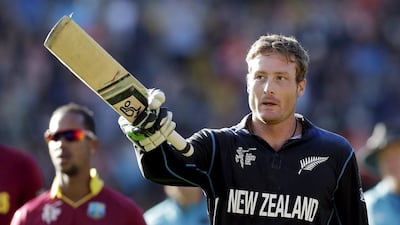If the 2015 World Cup was to be judged by its headline numbers, it may be eventually recognised as the first 50-over World Cup in which the impact of the Twenty20 game on modern batting became evident.
By almost every metric, this was a tournament lit up by batsmen. The most 400-plus and 300-plus totals, more hundreds, the first World Cup double hundreds, a new high for the collective strike rate, more sixes and fours, more overall runs — it all speaks unmistakably of Twenty20’s effect.
Legislation, such as fielding restrictions, a new ball at each end and smaller boundaries, has fuelled this glut. But far more has been the distinct shift in the minds of batsmen.
Risk is no longer just a calculation, it is simply embraced. Batsmen batted — we heard often — as if there were no stumps behind them.
This realisation has come to every side except Pakistan. Even weaker sides, or associates, such as Zimbabwe, Ireland, Bangladesh, UAE and Scotland all had days in which this new bravado was clear.
In particular, this new attitude expressed itself in late-over assaults.
RELATED:
— GALLERY: The National’s cricket World Cup team of the tournament
— New Zealand the latest ‘golden generation’ to be trampled by Australia
— ‘A lovely way to finish’: Daniel Vettori calls time on New Zealand career
On six occasions teams doubled their score at the 35th over, which perhaps is the beginning of a shift away from the old maxim that sides lived by in doubling the score at the 30th.
In that vein, the feats of AB de Villiers and Glenn Maxwell could well be identified as the signature innings of the tournament.
Though in their execution their feats were, in one sense, not a complete rewiring of ODI batting, at least not strategy wise.
The death overs are where batsmen have always gone ballistic, especially with wickets in hand. This World Cup was just an extrapolation of an existing truth. Ballistic just has a new set of parameters.
Where batting in this World Cup was the truest manifestation of Twenty20, though, was at the other end of the innings and in the infectious recklessness of one man.
Brendon McCullum did not end among the top 15 run-scorers at the World Cup, but he succeeded five times in nine innings and ended with four fifties.
He made no score higher than 77 and only once did he bat past the eighth over.
His opening game 65 apart, each of his four other significant innings were over by the sixth, seventh or eighth overs.
That run replicated more accurately Twenty20 cricket and the six-over power play that begins a shortest-form match, where short, sharp attacks can alter the course of games.
McCullum never batted long, but he shaped long matches with brief interventions. Almost every other side started cautiously.
Yet it is too simple to conclude that this was a World Cup shaped entirely by feats of batting.
The tournament, and indeed the 50-over game, felt most alive when it was running on the sweat and adrenalin of fast bowling, which in most cases here was extremely fast bowling.
Not since 1999, when the tournament was last played in England, have fast bowlers been such a factor at a World Cup.
That year only two spinners featured in the top 20 wicket takers. This time there were only three in the top 20, the same as the 2003 edition in South Africa.
Pakistan survived on their pacemen alone, Australia’s fast bowlers won them the final and New Zealand’s helped get them there.
India also rediscovered the joys of bowling fast, while Afghanistan’s potential looked greatest in the hands of Shapoor Zadran and Hamid Hassan.
Conditions played a role. Even if surfaces were not especially bowler friendly, they carried more bounce than pitches almost anywhere in the world.
Unsurprisingly, the bouncer re-emerged as a genuine attacking weapon, not just as a dot ball, while, thankfully, that infuriating sign of the emaciated fast bowler, the slower bouncer, was mostly absent.
Fuller length balls, at pace and with even a hint of swing, were not merely driving practice for batsmen, they were taking wickets.
There was an element of compulsion about this. Penned in by a game increasingly beholden to batting, fielding captains had to free their minds. They had no choice but to search for wickets because runs could not be kept down.
Mostly it was enthralling, but it is unlikely to be a harbinger for any great change.
Fast bowlers were able to do this because they were bowling in Australia and New Zealand. Elsewhere, without administrative action, flatter surfaces will ensure the intrinsic imbalance between bat and ball feels heightened.
Fielding restrictions, for a start, will need re-examining. There is talk of allowing an extra fielder out for a portion of the innings, perhaps during the last 10 overs. Boundary and bat sizes could do with stricter regulation.
Not least it may allow spinners to return, a breed whose absence was severely felt this time.
FOLLOW US ON TWITTER @NatSportUAE

